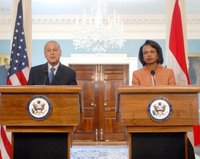Technorati Tags: President Bush and White House or Ahmed Aboul Gheit and Egyptian or Egypt and Secretary Condoleezza Rice and Lebanon or State Department and Secretary of State,
 | Secretary Condoleezza Rice, Washington, DC, July 18, 2006 (1:45 p.m. EDT), Watch, file is windows media format, running time is 05:43. Listen, file is mp3 in m3u format for streaming play back, running time is 05:43. Download, file is mp3 format for PODCAST, running time is 05:43. |
We obviously have a very strong and longstanding strategic relationship, but it is of course a time of great change in the Middle East, it is a time of great change in Egypt itself, and it makes therefore even more important our constant discussion and consultation. We talk about matters of economic development. We talk about internal political developments in Egypt and in the region.
And it will not surprise you that given the circumstances evolving in the Middle East today that we have spent already a good deal of time talking about the challenging situation in the region. We both have talked about our concerns for the safety of civilians, that all should be concerned about protecting innocent civilian life, about protecting civilian infrastructure. We are of course both devoted to the evolution of a stable and sovereign Lebanon on the basis of Resolution 1559 and we have talked about how to improve the circumstances in which that can be carried out.
Egypt is of course a good partner as we work for a two-state solution between Israel and Palestine, and we have talked also about trying to get that situation back on the road to -- back on the roadmap.
And so it has been a very fruitful discussion thus far. I've promised to buy Ahmed lunch so that we can continue our discussions and broaden those discussions. But thank you very much for being here, Minister, and I look forward to further discussions with you today and in the future.
FOREIGN MINISTER GHEIT: Thank you very much, Secretary. Yes, I am pleased to initiate the Strategic Dialogue between the United States and Egypt. The relationship between both is a strategic relationship and it is a lasting, long-lasting relationship.
We of course today had the opportunity to engage in discussions on the situation in the Middle East and the wider Middle East, meaning the situation in Lebanon, the Palestinian problem, the situation in Gaza. We discussed ways and means how to bring a cessation of hostilities to an end, to establish a ceasefire, how to create the conducive environment for that ceasefire, the implementation of 1559, the deployment of the Lebanese army to the borders, the introduction of a strong peacekeeping operation or at least the widening of the presence of UNIFIL in that region.
SECRETARY RICE: Thank you very much.
FOREIGN MINISTER GHEIT: We will continue discussions during and over lunch to cover also other areas of concern.
QUESTION: Madame Secretary --
QUESTION: Madame Secretary, will you take a question, please?
QUESTION: Madame Secretary, is it time for the United States to, instead of relying on the UN envoys and their report, to become more immediately involved, to become more engaged? And how long do you think Israel should have before it should consider a ceasefire?
SECRETARY RICE: Andrea, first of all, I think that the G-8 was very eloquent in speaking about the need to deal with creating conducive circumstances. We all want a cessation of violence. We all want a protection -- the protection of civilians. We have to make certain that anything that we do is going to be of lasting value. The Middle East has been through too many spasms of violence and we have to deal with underlying conditions so that we can create a sustainable conditions for -- so that we can create sustainable conditions for political progress there.
As to my own involvement, I am very deeply involved with my colleagues, with the regional states like Egypt which is a leader, with my G-8 and P-5 colleagues. I talked today to Mr. Solana. And as I have said, when it is appropriate and when it is necessary and will be helpful to the situation, I am more than pleased to go to the region.
FOREIGN MINISTER GHEIT: Andrea --
QUESTION: Is the U.S. going to --
FOREIGN MINISTER GHEIT: Andrea, a ceasefire is imperative and we have to keep working to reach that objective. It is imperative. We have to bring it to an end as soon as possible. Thank you.
QUESTION: Should there be a ceasefire now?
SECRETARY RICE: We all agree that it should happen as soon as possible when conditions are conducive to do so.
2006/693, Released on July 18, 2006
Related: Keyword Egypt, Friday, May 19, 2006 Statement on Denial of the Appeal of Egyptian Politician Ayman Nour, Tuesday, December 27, 2005 , Sunday, March 06, 2005 Mohammad Hosni Mubarak, Hamad Ben Issa Al-Khalifa, Monday, March 14, 2005 Karen P. Hughes, Dina Habib Powell, of Texas, Thursday, May 12, 2005 President Bush will welcome Prime Minister Nazif of the Arab Republic of Egypt, Friday, May 27, 2005 Egyptian Referendum Vote, Wednesday, July 06, 2005 Zoellick To Travel to the Sudan, Jordan and Egypt, Friday, July 08, 2005 Killing of Egyptian Envoy to Iraq, Ihab al-Sherif, Monday, July 25, 2005 President Signs Egyptian Condolence Book, Sunday, September 11, 2005 Egyptian Presidential Election, Tuesday, September 27, 2005 Karen Hughes, Remarks with Dr. Ali El Samman, Cairo, Egypt, Tuesday, November 15, 2005 Secretary Condoleezza Rice, Gaza Agreement,







No comments:
Post a Comment